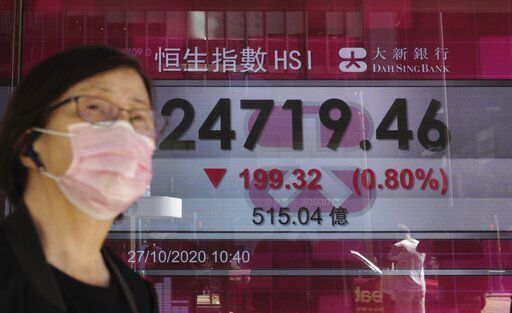NEW YORK — U.S. stocks are drifting today, as momentum slows a day after Wall Street slumped to its worst loss in a month on worries about rising virus counts and Washington’s inability to deliver more aid to the economy.
The S&P 500 was virtually unchanged in early trading after swinging between a loss of 0.1% and a gain of 0.2%. Technology stocks were among the market’s strongest after AMD said it would buy fellow chipmaker Xilinx for $35 billion. They helped counterbalance losses for energy stocks and other areas of the market whose profits are closely tied to the strength of the economy.
The parade of companies reporting better profits than expected for the last quarter also continued to grow, helping to steady the market. Merck, Invesco and Laboratory Corp. of America were among the roughly two dozen companies in the S&P 500 this morning that reported earnings for the summer above analysts’ expectations.
The Dow Jones Industrial Average was down 52 points, or 0.2%, at 27,635 as of 8:50 a.m. Central time, and the Nasdaq composite was 0.4% higher.
Still, caution continues to hang over markets. Coronavirus counts continue to climb at a troubling rate across much of the United States and Europe. The worry is that could lead to the return of lockdowns in hopes of slowing the pandemic’s spread, which could further choke off the improvements the economy showed during the summer.
The economy’s momentum has already slowed following the expiration of supplemental benefits for laid-off workers and other support that Congress approved for the economy earlier this year.
Reports on the economy released Thursday were mixed. Orders for big-ticket manufactured goods rose 1.9% in September, an acceleration from August’s 0.4% growth and better than economists expected but well below July’s 11.8%. Consumer confidence also weakened a bit in October, when economists were expecting it to hold steady.
Investors have been clamoring for Congress to deliver another round of stimulus for the economy, but they’re increasingly acknowledging it won’t happen anytime soon.
House Speaker Nancy Pelosi and Treasury Secretary Steven Mnuchin continued their negotiations on a deal Monday afternoon, and a Pelosi spokesman said she’s optimistic an agreement can happen before Election Day next week. But any deal would likely face stiff resistance from Republicans in the Senate. After approving the latest Supreme Court justice, the Senate is unlikely to return to session until Nov. 9.
The market’s caution is also apparent in how it’s reacting to corporate profit reports. Through the first two weeks of earnings season, companies that reported better results than expected have not been getting the typical pop in their stock price the day after. That’s an indication that all the good news has already been built into the market, according to BofA Global Research.
F5 Networks rose 8.3% for one of the best gains in the S&P 500 after it reported better earnings than expected. But 3M fell 2.3% despite also reporting stronger results than forecast.
In another sign of increased caution, Treasury yields retrenched again. The yield on the 10-year Treasury fell to 0.79% from 0.81% late Monday.
In European stock markets, France’s CAC 40 fell 1.2%, and Germany’s DAX lost 0.4%. The FTSE 100 in London dropped 0.5%.
In Asia, Japan’s Nikkei 225 was close to flat, while South Korea’s Kospi lost 0.6% and Hong Kong’s Hang Seng slipped 0.4%. Stocks in Shanghai inched up 0.1%.


